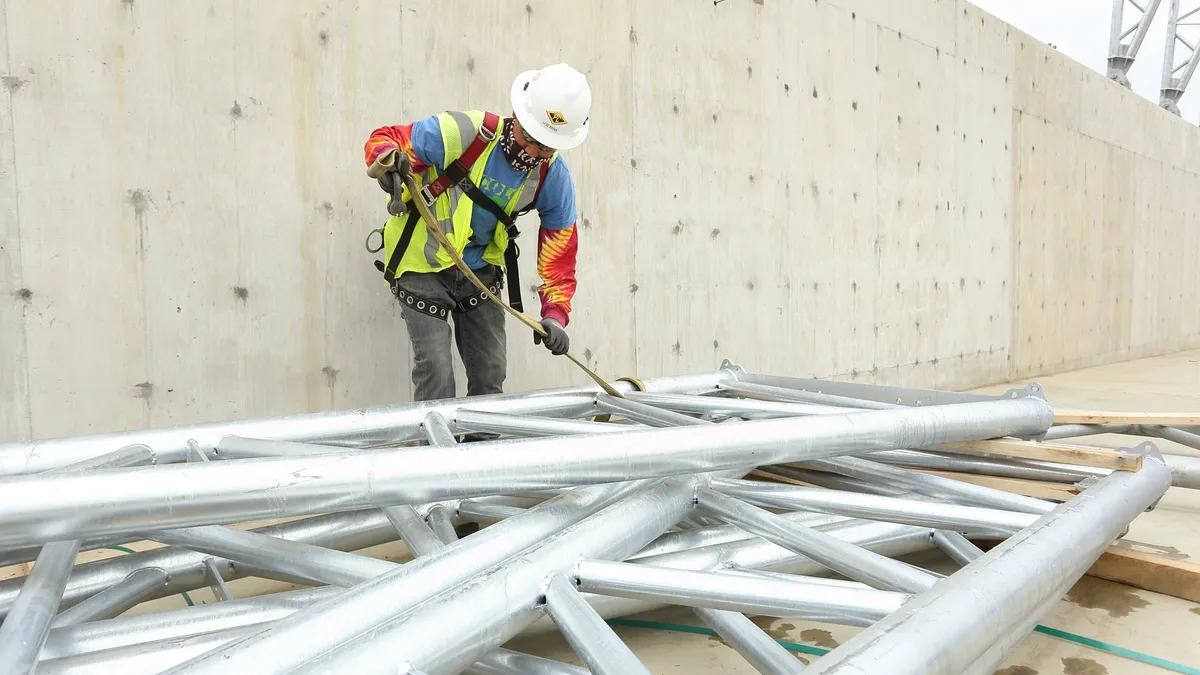Dive Brief:
- Projects funded by the $1.2 trillion infrastructure package must only use iron and steel produced in the U.S., according to a White House memo.
- The requirement, which was included in the Infrastructure Investment and Jobs Act, means all manufacturing processes for the metals, from the initial melting stage through the application of coatings, must occur in the U.S. starting May 14.
- The announcement includes a process to waive those requirements if domestic materials are not reasonably available or would raise the cost of the project by more than 25%.
Dive Insight:
Imports of iron and steel to the U.S. reached about $38.9 billion last year, according to the United Nations COMTRADE database, its highest level since tracking began in the early 1990s.
About 21% of the structural steel used in the U.S. in 2017 was sourced from overseas, according to the American Institute of Steel Construction. Canada accounted for the largest share of U.S. imports of steel mill products by volume in 2020 at 23.7%, followed by Brazil and Mexico at 18.3% and 15.0% respectively, according to the International Trade Administration.
The administration did not say what percentage of construction material for current infrastructure projects is U.S.-produced, or what portion of the $350 billion in infrastructure funding being spent this year is being spent on U.S.-made goods.
The new guidelines would effectively enable government officials to know how many dollars go to U.S. workers and factories, according to the AP.
However, construction association executives questioned whether the rules will add to already soaring construction costs and high inflation.
Stephen E. Sandherr, Associated General Contractors of America CEO, said the new guidance will ultimately undermine infrastructure spending benefits.
"It makes no sense to place unrealistic limitations on firms' ability to source key materials at a time when prices for those products are skyrocketing and supplies are limited," said Sandherr in a statement. "Supply chain shortages are already prompting firms to avoid bidding on new projects."
Materials costs increased 21.2% from February 2021 to February 2022, according to a JLL construction report. Those costs are expected to increase another 8% to 12% over the next year, according to the report.
"Whatever minimal gains in domestic construction material production this new mandate might temporarily generate will be offset by the increased cost of constructing new projects, slower schedules to build those projects and the fact some key projects could be hamstrung from moving forward," said Sandherr. "This new mandate will leave too many taxpayers wondering where the trillion dollars went while they are still stuck in traffic, still hearing about boil water orders and still wondering why we can’t have better transit systems."
Federal projects
Stock prices for the largest U.S. steel producers such as Nucor, ArcelorMittal, U.S. Steel Corp. and Steel Dynamics increased Monday after the announcement from the White House.
Kevin Dempsey, president and CEO of the American Iron and Steel Institute trade group, lauded the guidance, but said more could be done and noted that not all federal programs have Buy America mandates.
Former President Donald Trump signed an executive order in 2017 with similar requirements. Those restrictions limited the materials public agencies could buy from foreign manufacturers.
"This announcement is an important first step toward ensuring the fullest possible implementation and enforcement of Buy America domestic procurement preferences by all federal agencies," Dempsey said in a statement.












